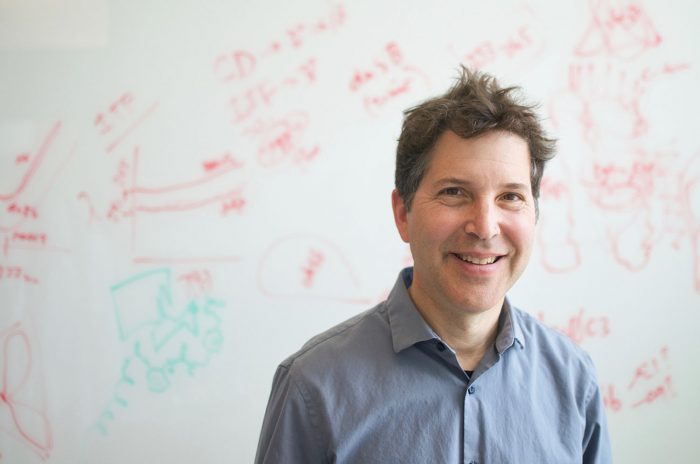
David Baker will present the 2021 Max Perutz Lecture, titled ‘The coming of age of de novo protein design’ at 4:00pm (BST) on Tuesday 27th of April. Owing to ongoing travel restrictions and social distancing measures, this year the talk will be hosted on Zoom. Attendance is free and is open to any who are interested.
David is the director of the Institute for Protein Design at the University of Washington, USA. He is also the Aubrey Davis Endowed Professor in Biochemistry, an adjunct professor of genome sciences, bioengineering, chemical engineering, computer science, and physics, and a Howard Hughes Medical Institute Investigator. His group’s research focuses on protein design and protein structure prediction.
Recently, David’s group has received acclaim for their response to the Covid-19 pandemic. Using computers, they designed new proteins which bind onto the spike proteins of SARS-CoV-2 (the virus that causes Covid-19), and thus minimise its ability to infect cells. Since January 2020, over two million potential spike-binding proteins have been designed, and over 118,000 produced and tested in the lab. Further, the group has recently collaborated with the LMB to re-engineer two proteins into a two-dimensional honeycomb structure, which has proved useful in investigating endocytosis – a fundamental process of cell biology. This milestone accomplishment highlights the potential of protein engineering to produce new materials to reform and regulate biological systems.
David earned his PhD in Biochemistry with Randy Schekman at the University of California, Berkeley, before working as a postdoctoral fellow in biophysics in David Agard’s lab at the University of California, San Francisco. Throughout his career, he has been the recipient of numerous honours, such as the 2012 Centenary Award from the Biochemical Society, the 2018 Hans Neurath Award from the Protein Society, and most recently, the 2021 Breakthrough Prize in Life Sciences. David is also a member of the National Academy of Sciences and the American Academy of Arts and Sciences. He has published over 500 research papers, been granted over 100 patents, and co-founded 11 companies.
Lecture abstract
Proteins mediate the critical processes of life and beautifully solve the challenges faced during the evolution of modern organisms. Our goal is to design a new generation of proteins that address current-day problems not faced during evolution. In contrast to traditional protein engineering efforts, which have focused on modifying naturally occurring proteins, we design new proteins from scratch based on Anfinsen’s principle that proteins fold to their global free energy minimum. We compute amino acid sequences predicted to fold into proteins with new structures and functions, produce synthetic genes encoding these sequences, and characterize them experimentally. SARS-COV2 provided a test of the relevance of these methods to real-world challenges.
In this talk, I will describe the de novo design of SARS-COV2 candidate diagnostics, therapeutics, and vaccines: designed switches which luminesce in the presence of antiviral antibodies, designed 55 residue proteins that bind to the Spike with picomolar affinity and block viral infection, and nanoparticle immunogens which elicit much higher yields of neutralizing antibodies in animals than the Spike trimer that is the basis of most current vaccine trials. I will discuss the status of getting these into the clinic, and lessons for combatting future pandemics, and then describe several additional recent advances in de novo protein design, including the hallucination of new proteins using deep neural networks.
Background information
The Max Perutz Lecture is one of a series of named lectures organised by the LMB to be delivered by esteemed scientists from around the world, and is given in honour of LMB alumnus and Nobel Laureate Max Perutz. Max first arrived in Cambridge in 1936 as a research student to study X-ray crystallography at the Cavendish Laboratory under J. D. Bernal. He soon became a world leader in the field of molecular biology, developing a novel technique to determine the structure of proteins. Max is a central figure in the LMB’s history: he was the first Director of the ‘MRC Unit for Research on the Molecular Structure of Biological Systems’ upon its establishment in 1947, and became the first Chairman of the unit when it became the MRC Laboratory of Molecular Biology (LMB) in 1962. In this year, he was also awarded the Nobel Prize in Chemistry jointly with John Kendrew for their studies on protein structures. He remained at the helm of the LMB as the lab grew to be a preeminent research institute, before retiring in 1979. He died, aged 87, in Cambridge, on 6 February 2002.
Further references
YouTube Link to the Lecture
David Baker Lab
LMB Named Lectures
Max Perutz
Poster for the Lecture